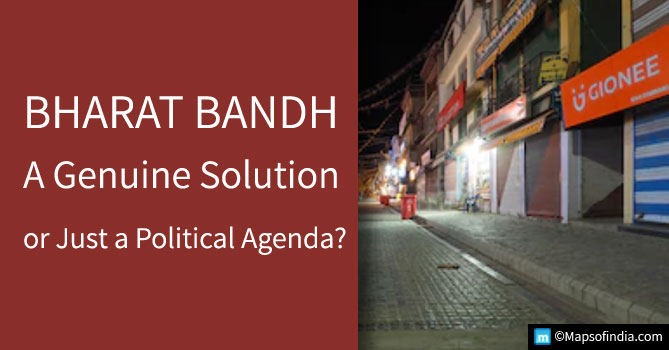Politics has never been a stable game, and politicians never the “defeat accepting” players. One year, the power is in the hands of a certain party, and in the next? You never know. This game of assuming roles of “leading” and “opposition” party continues year after year. The essence of our democracy, right?
Like every other year, 2018 has been turbulent for the country’s political scene. And, why not? We are a gigantic nation, the largest democracy, and a blooming economy. It is in this one giant game, that a masterstroke is often played- Bharat Bandh. It is an age-old card, and was put on show once again in September, 2018, when the opposition called for a Bharat bandh to protest against the rising petrol prices.
This is not a testimony on the opposition, or the ruling party, merely a question. Are Bharat Bandhs really the solutions to our problems? And, if yes, are they the best solution our thriving democracy has?
India’s tryst with “bandhs”
“Bandh” is a Hindi word, which means “closed”. It is a form of protest, quite similar to general strikes, but often having a more political agenda and significance. Like general strikes, the masses are appealed to, to participate- including the labour force, large communities etc. Consequently, whether or not a bandh has been successful, is seen by the amount of support it got from the general public.
India has had an intimate “love-hate” relationship with bandhs. Love-hate because, while a party in power would condemn this mass movement, the same party is almost guaranteed to use it as a weapon, once becoming the opposition. Politicians know it is a very strong tool to urge for civil disobedience. This is why, the history of democratic India has witnessed Bharat bandhs on many occasions.
The September, 2018 bandh was announced and carried forward by Congress, protesting against the petrol price hikes under the BJP government. However, an almost flipped picture was seen in the country a few years ago. Back in 2010, and again in 2012, it was the BJP-led National Democratic Alliance (NDA), that called for a Bharat Bandh against fuel prices hike. Déjà vu is not exactly uncommon in Indian politics, after all.
A close scrutiny
The essence of any democracy is the power of the common man. Naturally then, any unfair events must be met with some resistance. If a healthy democracy thrives on protest and dissent, why do we question the credibility of “bandhs” so often? Aren’t they a powerful way to tell the government that it might be in power, but it still works for the people? Let’s discuss this layer by layer.
Economical loss: We know that during these country-level shutdowns, people from all sectors are urged to participate. As mentioned before, the success depends on how many people you are able to mobilise. Naturally then, greater the share of the labour force participating, the more interruptions in the working of the economy. Back in 2010, when the opposition launched a Bharat Bandh against the then UPA government, the industry reported an expected loss of Rs 13,000 crore! Note that we are talking about losses in one day.
Problems faced by civilians: While bandhs are said to be for the rights of the common man, it is usually them who suffer the most at the hands of these political movements. Public transportation, roads etc remain blocked on a stretch, for hours at least. Any sort of business, local medical shops, grocery stores etc remain majorly closed down. Moreover, commuting becomes a cumbersome task. In September, 2018 petrol price Bharat bandh, for instance, a child lost her life. According to the father, the two-year-old girl was being taken to the hospital but died midway because they couldn’t reach on time, given the traffic interruption by the bandh.
Conclusion
Many are claiming that the death of the young girl was not because of the bandh, but because the parents did not leave for the hospital on time. Even if that is true, the matter at hand is, are shutdowns really the best way to go about a protest? There is no denying that they cause severe interruptions to the daily life in our country. The industry complains about the loss it suffers, and many civilians, about the serious discomfort and problems they go through. Then, who is actually benefitting? Yes, voices of dissent are necessary, and they should be strong enough that the government cannot shrug them off. But surely, there are better ways. Bandhs, more often than not, result in violence of some kind.
A food for thought, then. Can we not look for other ways of protest? Ones that essentially do not leave the common man crippled? Perhaps, we can.






